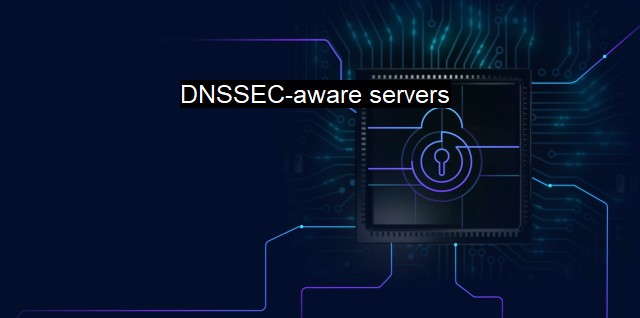What are DNSSEC-aware servers?
Securing the Internet's Phonebook: DNSSEC-Aware Servers and Their Importance in Ensuring Integrious DNS Infrastructure
Domain Name System Security Extensions (DNSSEC) are a set of extensions designed to add an extra level of security to the DNS protocol, the addressing protocol of the Internet. DNS involves a mapped domain name into an IP address, a fundamental system that establishes the connectivity of websites. Since the DNS uses insecure protocols, its primary vulnerability is Domain Name System spoofing, also known as DNS spoofing or cache poisoning. DNSSEC-aware servers play an essential role in the DNS infrastructure in bringing effective security measures against the risks associated with these dangers.DNSSEC-aware servers significantly contribute to amplifying the defense structure. They authenticate and ensure the integrity of the network data in the DNS resolution path. They operate by digitally signing each DNS record at the authoritative DNS server by the cryptographic key. Subsequently, the DNS resolver then validates these digital signatures in order to build a 'chain of trust' from the parent to the authoritative DNS server of the domain.
The DNSSEC-aware servers use a set of public-key cryptography operations which may be complex but are ultimately very useful. They can sign DNS data, generate cryptographic keys, and offer signature verification services. they manage and secure these cryptographic keys safely. All these processes are handled while maintaining, improving, and assuring the domain's availability to requesters.
The operation of these servers can be seen as having the function of the cyber bouncer of your network, categorizing and analyzing the internet traffic coming in and out of the network. The adoption of DNSSEC-aware servers promises cybersecurity benefits that extend from averting threats such as DNS spoofing and DDoS attacks, to safely encapsulating the network's substantial data. Hence, increasing the accuracy and reliability of the data exchanged within and between networks.
One of the significant things about DNSSEC-aware servers is that they offer a robust way of encrypting network data flow, which is an essential aspect in ascertaining cybersecurity. They ensure that data requests come from a server that is exactly who it claims to be and is not compromised. these servers help eliminate cache poisoning, which could potentially establish malicious sites or Internet destinations.
Despite the clear advantages, incorporating DNSSEC-aware servers into a network also has some challenges including dealing with larger DNS message sizes due to DNSSEC signatures, which could potentially cause performance issues in some networking environments. Notwithstanding these, adapting DNSSEC-aware servers is still considered a tactical maneuver in the always evolving battlefield of cybersecurity.
The need for rigorous cybersecurity practices, including using DNSSEC-aware servers, is becoming paramount now more than ever in a hyper-connected digital era, where potential risks from cyber threats are on a meteoric rise. More formal adoption and continual research into DNSSEC is vital as it holds promising innovation in antivirus and cybersecurity sphere.
DNSSEC-aware servers are crucial enablers of a trusted internet where data integrity is ensured. As part of the broader cybersecurity landscape, antivirus solutions providers are integrating the use of these DNSSEC-aware servers in their security functionalities. Their tools consistantly use DNSSEC principles to secure browsing for their users. They help to maintain data integrity, prevent unauthenticated data, and assist in blocking harmful or malicious content from reaching the end users, making Internet a safer place.
On the whole, DNSSEC-aware servers add an additional, robust layer of security to the internet. They dynamically form a protective environment which can accurately counteract various types of internet based threats and attacks, ensuring cybersecurity on all fronts. Despite posing some challenges, their benefits far outweigh the risks and position them as a superior defense solution in the cybersecurity domain.

DNSSEC-aware servers FAQs
What is a DNSSEC-aware server?
A DNSSEC-aware server is a server that supports the DNS Security Extensions (DNSSEC) protocol. DNSSEC is a security protocol that adds an additional layer of security to the Domain Name System (DNS), which is used to translate domain names into IP addresses.How does a DNSSEC-aware server enhance cybersecurity?
A DNSSEC-aware server enhances cybersecurity by ensuring that the information returned by the DNS server is authentic and has not been tampered with. It provides a way to verify that the information received from the DNS server is accurate, which helps prevent DNS spoofing attacks and other types of DNS-related attacks.Is it necessary to use a DNSSEC-aware server for antivirus protection?
No, using a DNSSEC-aware server is not necessary for antivirus protection. However, it can add an additional layer of security to your network and help prevent attacks on your DNS infrastructure. This, in turn, can help prevent malware infections and other types of cybersecurity threats.How can I tell if my server is DNSSEC-aware?
You can check if your server is DNSSEC-aware by running a DNSSEC validation test. There are several online tools available that can perform this test, which will indicate whether your DNS server is configured to support DNSSEC. You can also check the documentation or contact the support team for your DNS server software to confirm if it supports DNSSEC.| | A | | | B | | | C | | | D | | | E | | | F | | | G | | | H | | | I | | | J | | | K | | | L | | | M | |
| | N | | | O | | | P | | | Q | | | R | | | S | | | T | | | U | | | V | | | W | | | X | | | Y | | | Z | |
| | 1 | | | 2 | | | 3 | | | 4 | | | 7 | | | 8 | | |||||||